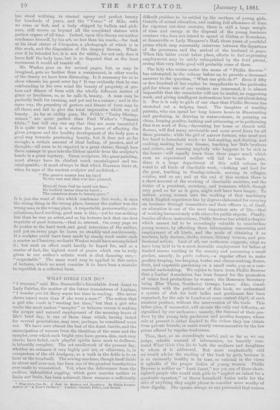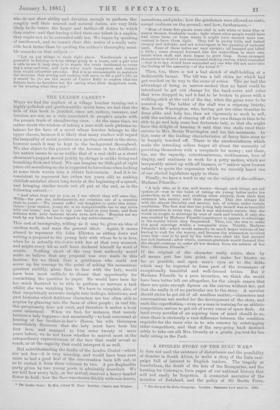WHAT GIRLS CAN DO.* "I WONDER," said Mrs. Somerville's formidable
Aunt Janet to Lady Fairfax, the mother of the future translatress of Laplace, I wonder you let Mary waste her time in reading. She never shews (sews) more than if she were a man !" The notion that ti girl who reads is wasting her time," but that a girl Who works the most useless " sampler " or hideous screen is making the proper and natural employment of the morning hours of life's brief day, is one of those ideas which, having lasted for several generations, may now, perhaps, be considered worn out. We have seen almost the last of the Aunt Janets, and the emancipation of woman from the thraldom of the seam and the sampler, over which such bright eyes have grown dim, such rosy cheeks have faded, such playful spirits have sunk to dullness, is tolerably complete. The art-needlework of the present day, whether we estimate it very highly qud art, or otherwise, is, in comparison of the old drudgery, as a walk in the fields is to an hour at the treadmill. The sewing-machine, though itself liable to abuse and over-use, has been one of the greatest benefactions ever made to womankind. Yet, when the deliverance from the endless, unhealthful niggling, which gave exercise neither to limbs nor brain, has been achieved, there remains a sufficiently
* ll'hal Girls Can Do. A Book for Mothers and Davghters. By Phillla Browne Author of 0 A Year's Cookery." London: Calaell, Pettey, and clalidn.
difficult problem to be settled by the mothers of young girls. Outside of actual education, and making full allowance of time for vigorous out-door exercise, there is still a large margin of time and energy at the disposal of the young feminine creature who does not intend to spend at Girton or Newnham, at Somerville or Lady Margaret's Hall, those years of youthful prime which may reasonably intervene between the departure of the governess and the arrival of the husband in posse. When this latter event takes place, efforts to find engrossing employment may be safely relinquished by the fond parent, seeing that very little good will probably come of them.
The lady who writes under the name of " Phillis Browne" has attempted, in the volume before us, to provide a thousand answers to the question, " What can girls do P" Even if fifty or five hundred of her replies be inapplicable to the Particular girl for whom one of our readers are interested, it is almost impossible that the remainder will not be useful, as suggesting work, and giving intelligent instructions how to set about doing it. Nor is it only to girls of one class that Phillis Browne has stretched out a helping hand. The daughter of wealthy parents, who can spend her long leisure hours in illuminating and gardening, in drawing in water-colours, in painting on china, keeping poultry, bathing and swimming, or in performing that true work of Eve,—decorating her home or church with flowers, will fiud many serviceable and some uovel.hints for all these pursuits; while the girl of narrow fortune, who must put her hand to household work—to bed-making, and dusting, and cooking, making her own dresses, teaching her little brothers and sisters, and nursing anybody who happens to be sick in the house—will equally learn from these pages- much which even an experienced mother will fail to teach. Again, there is a largo department of this solid volume de- voted to all kinds of charitable work,—clothing and food for the poor, teaching in Sunday-schools, nursing in villages, erOelies, and so on ; and at the end of this section there is a short account of the working of charitable societies, and the duties of a president, secretary, and treasurer, which, though very good so far as it goes, might well have been longer. To initiate young women into the working of that machinery which English experience has by degrees elaborated for carrying on business through committees and their officers is, of itself, an education in one of the most important arts of life,—that of working harmoniously with others for public objects. Finally, besides all these instructions, Phillis Browne has added a chapter which cannot fail to be exceedingly valuable to numberless young women, by affording them information concerning paid employment of all kinds, and the mode of obtaining it as teachers, lady doctors, clerks, nurses, literary women, and pro- fessional artists. Last of all, our authoress suggests, what we have long held to be a most desirable employment for ladies of limited means residing in the country and possessing a smell garden, namely, /a petite cultare,—a regular effort to make poultry-keeping, bee-keeping, butter and cheese-making, flower, fruit, and vegetable gardening on a small scale, pay as a com- mercial undertaking. We rejoice to learn from Phillis Browne that a Ladies' Association has been formed for the promotion of minor food productions by women; the Honorary Secretary being Miss Thorn, Southover Grange, Lewes. Also, simul- taneously with the publication of this book, we understand a species of club for both ladies and gentlemen has been organised, for the sale in Loudon at some central ddp6t, of such amateur produce, without the intervention of the trade. This latter plan, if successful, will obviate the only real difficulty, as signalised by our authoress ; namely, the disposal of their pro- duce by the young lady gardeners and. poultry-keepers, whose sale at present is either limited to the orders they can obtain from private friends, or made nearly unremuuerative by the low prices offered by regular tradesmen.
Thus, then, as an exceedingly useful, and, so far as wo can judge, reliable manual of information, we heartily com- mend What Girls Cant Do to both the mothers and daughters to whom it is addressed. But more emphatically still we would advise the reading of the book by girls, because it is so eminently healthy in its tone, so rational in the views it upholds of the proper duties of young women. Millis Browne is neither an "Aunt Janet," nor yet one of those short- sighted people who would wish girls to " neglect an infant for a quadratic equation," or throw household duties aside for the sake of anything they might please to consider more worthy of their dignity. She speaks always as one persuaded that women.
who do not show ability and devotion enough to perform tho- roughly well their nearest and natural duties, are very little likely to do better the larger and farther-off duties to which they aspire; and that having rolled their one talent in a napkin, they ought not to be entrusted with ten. We began by speaking of needlework, and we cannot close this notice of a really valu- able book better than by quoting the author's thoroughly sensi- ble remarks on that subject :—
" Let us put things in their right place. Needlework is most powerful in helping to keep things going in a house, and a girl who is able to use it may step in to repair the rents incidental to every day's wear-and-tear, and turn away much annoyance and temper they would otherwise provoke. But it is ae unreasonable to maintain the doctrine that sewing and cooking will serve to fill a girl's life, as it would be (to use the words of Currer Bell) to expect that the fathers have no faculties but for eating what their daughters cook, or for wearing what they sew."















































 Previous page
Previous page